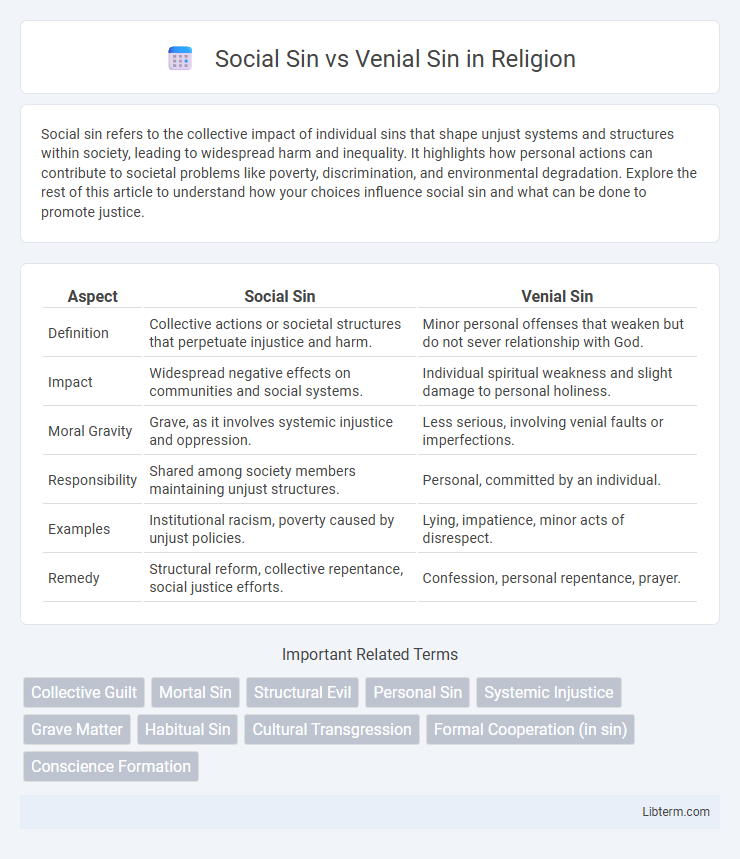Social sin refers to the collective impact of individual sins that shape unjust systems and structures within society, leading to widespread harm and inequality. It highlights how personal actions can contribute to societal problems like poverty, discrimination, and environmental degradation. Explore the rest of this article to understand how your choices influence social sin and what can be done to promote justice.
Table of Comparison
| Aspect | Social Sin | Venial Sin |
|---|---|---|
| Definition | Collective actions or societal structures that perpetuate injustice and harm. | Minor personal offenses that weaken but do not sever relationship with God. |
| Impact | Widespread negative effects on communities and social systems. | Individual spiritual weakness and slight damage to personal holiness. |
| Moral Gravity | Grave, as it involves systemic injustice and oppression. | Less serious, involving venial faults or imperfections. |
| Responsibility | Shared among society members maintaining unjust structures. | Personal, committed by an individual. |
| Examples | Institutional racism, poverty caused by unjust policies. | Lying, impatience, minor acts of disrespect. |
| Remedy | Structural reform, collective repentance, social justice efforts. | Confession, personal repentance, prayer. |
Defining Social Sin
Social sin refers to the collective impact of personal sins that create unjust structures, systems, or institutions causing harm to society. Unlike venial sin, which involves less severe individual wrongdoing that weakens but does not rupture one's relationship with God, social sin manifests through communal actions contributing to widespread injustice. Understanding social sin emphasizes the responsibility of individuals to address societal inequalities and promote the common good.
Understanding Venial Sin
Venial sin refers to a lesser offense against divine law that weakens but does not sever the relationship with God, contrasted with social sin, which involves collective actions that perpetuate injustice within communities. Understanding venial sin highlights its subtle impact on personal morality and spiritual growth, emphasizing the importance of repentance and the sacraments for healing. While venial sins are forgivable and do not lead to eternal separation from God, they can accumulate, leading to greater moral decline if left unchecked.
Key Differences Between Social and Venial Sin
Social sin refers to collective actions or structures that perpetuate injustice and harm within society, altering social systems and affecting communities, while venial sin involves minor personal offenses that weaken individual relationships with God without severing them. The key difference lies in scope and impact: social sin has broader societal consequences embedded in institutions or group behaviors, whereas venial sin pertains to individual moral failings with limited spiritual harm. Social sin requires communal awareness and systemic change, contrasting the personal repentance and forgiveness associated with venial sin.
Origins and Historical Context
Social sin originates from collective actions and structures embedded in society that perpetuate injustice, rooted in biblical teachings and early Church doctrine emphasizing communal responsibility. Venial sin, historically defined in Thomistic theology, refers to minor personal failings that weaken but do not sever one's relationship with God. The distinction evolved during the Middle Ages, reflecting the Church's efforts to categorize moral culpability within individual and societal contexts.
Theological Perspectives on Social Sin
Theological perspectives on social sin emphasize its collective dimension, where societal structures perpetuate injustice and harm beyond individual faults, contrasting with venial sin's personal and less severe nature. Social sin often involves systemic issues such as racism, poverty, and environmental degradation, highlighting the responsibility of communities and institutions in moral evaluation. The Church teaches that addressing social sin requires corporate conversion and structural change, reflecting a deeper understanding of sin's relational and communal impact.
Spiritual Consequences of Venial Sin
Venial sin weakens the soul's relationship with God by diminishing sanctifying grace, leading to a gradual spiritual decline if unrepented. Unlike mortal sin, venial sin does not sever the divine connection but increases vulnerability to temptation and spiritual lethargy. Persistent venial sin can foster a habit of sinfulness, impairing growth in charity and holiness within the believer's spiritual life.
Manifestations of Social Sin in Modern Society
Social sin manifests in modern society through systemic inequalities, institutional discrimination, and environmental degradation that perpetuate collective harm beyond individual actions. These manifestations include poverty, racism, unjust laws, and widespread consumerism that marginalize vulnerable groups and disrupt social harmony. Unlike venial sins, which are personal and minor moral failings, social sins implicate communities and structures, requiring communal responsibility and social reform.
Personal Responsibility and Community Impact
Social sin arises from collective actions or structures that perpetuate injustice, reflecting shared personal responsibility within a community. Venial sin involves individual, less severe moral failings that weaken one's relationship with God but do not sever it entirely. Both forms of sin affect community well-being; social sin demands communal repentance and reform, while venial sin requires personal reflection and spiritual growth.
Approaches to Overcoming Both Sins
Overcoming social sin requires collective efforts, including community engagement, systemic change, and promoting justice through social institutions and policies aligned with moral values. Venial sin calls for personal spiritual practices such as frequent confession, prayer, and sincere repentance to restore the individual's relationship with God. Emphasizing both communal responsibility and individual transformation is essential to effectively address and transcend social and venial sins.
The Role of the Church in Addressing Sin
The Church plays a crucial role in addressing both social sin and venial sin by providing moral guidance, promoting repentance, and fostering communal reconciliation. It teaches that social sin arises from collective actions that perpetuate injustice and calls for systemic change through advocacy and education. For venial sin, the Church encourages personal confession, spiritual growth, and participation in the sacraments to restore grace and strengthen the individual's relationship with God.
Social Sin Infographic

 libterm.com
libterm.com